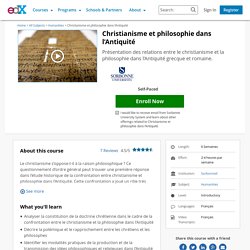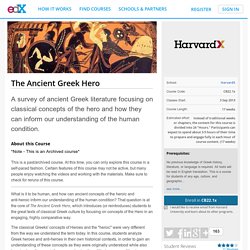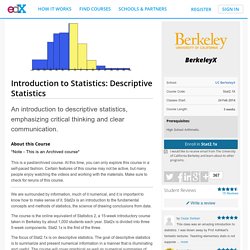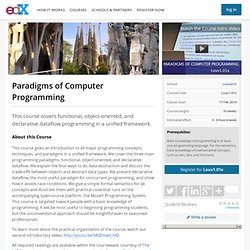

Christianisme et philosophie dans l’Antiquité. Le christianisme s’oppose-t-il à la raison philosophique ?

Ce questionnement d’ordre général peut trouver une première réponse dans l’étude historique de la confrontation entre christianisme et philosophie dans l’Antiquité. Cette confrontation a joué un rôle très important dans la constitution de la doctrine chrétienne. Elle prend la forme d’une polémique entre les chrétiens et les philosophes, mais également d’un rapprochement, les chrétiens reprenant à la philosophie un grand nombre de concepts et de modes de raisonnement pour penser, exprimer et défendre leur foi. On verra ce qui oppose le christianisme et la philosophie comme deux voies d’accès concurrentes à la vérité, avant d’envisager différents aspects de la dette du christianisme à l’égard de la philosophie antique.
On se demandera pour finir quel a été le rôle du christianisme dans l’histoire de la philosophie en tant que telle. The Ancient Greek Hero. *Note - This is an Archived course* This is a past/archived course.

At this time, you can only explore this course in a self-paced fashion. Certain features of this course may not be active, but many people enjoy watching the videos and working with the materials. Make sure to check for reruns of this course. What is it to be human, and how can ancient concepts of the heroic and anti-heroic inform our understanding of the human condition? The classical Greeks' concepts of Heroes and the "heroic" were very different from the way we understand the term today. In Greek tradition, a hero was a human, male or female, of the remote past, who was endowed with superhuman abilities by virtue of being descended from an immortal god. The true hero of the course is the logos ("word") of reasoned expression, as activated by Socratic dialogue. Before your course starts, try the new edX Demo where you can explore the fun, interactive learning environment and virtual labs. Quantitative Methods in Clinical & Public Health Research.
CaltechX: Learning From Data. BerkeleyX: Introduction to Statistics: Descriptive Statistics. Philip B.

Stark is Professor of Statistics at University of California, Berkeley where he developed the university's first online course. He has published research on the Big Bang, causal inference, the census, earthquake prediction, election auditing, food web models, the geomagnetic field, geriatric hearing loss, information retrieval, Internet content filters, nonparametrics, the seismic structure of Sun and Earth, spectroscopy, spectrum estimation, and uncertainty quantification for computational models of complex systems. He has consulted for the U.S. Departments of Agriculture, Commerce, Housing and Urban Development, Justice, and Veterans Affairs; the Federal Trade Commission; the California and Colorado Secretaries of State; the California Attorney General; and the Illinois State Attorney.
LouvainX: Paradigms of Computer Programming. This course gives an introduction to all major programming concepts, techniques, and paradigms in a unified framework.

We cover the three main programming paradigms: functional, object-oriented, and declarative dataflow. We explain the four ways to do data abstraction and discuss the trade-offs between objects and abstract data types. We present declarative dataflow, the most useful paradigm for concurrent programming, and show how it avoids race conditions. We give a simple formal semantics for all concepts and illustrate them with practical code that runs on the accompanying open-source platform, the Mozart Programming System. This course is targeted toward people with a basic knowledge of programming. Courses.